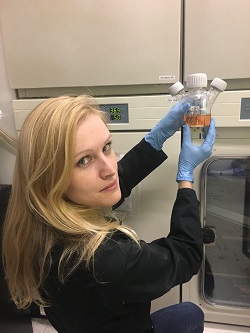Sylvie Janssens lives in Manhattan, New York, where she relocated after earning her PhD in biotechnology at Ghent University. She studied biomedical sciences at Ghent University, and prior to that, she completed a midwife degree at Artevelde College in Ghent. Since 2013, she has held a position as an academic researcher at the Icahn School of Medicine at Mount Sinai. Her research focuses on human embryonic stem cells, and she specializes in cerebral organoids. She grows miniature organs resembling the human brain, which she uses to study human brain-related diseases.
Do you enjoy your job?
Janssens: As with any job, working in academia has upsides and downsides. One very rewarding aspect is that I am able to contribute to healthcare. During my training as a midwife, I was directly confronted with prenatal complications and the sometimes-devastating consequences for the fetus or neonate. I am proud of having initiated, designed and implemented a complex project on the effects of congenital virus infection on the developing brain. The downsides of academic research are the many hours spent in the lab and having to deal with the frustrations intrinsic to basic research when experiments fail. However, in my job, I strongly enjoy participating and managing cross-institutional collaborations and working alongside highly skilled, top scientists.
I am impressed by how much of the human experience is shared by people growing up under very divergent circumstances.
Do you like Manhattan better than Belgium? What makes it different?
Janssens: At times, New York has felt quite lonely—especially in the first months after I arrived and homesickness started creeping in. However, I have experienced many wonderful moments shared with people from all over the world. I am impressed by how much of the human experience is shared by people growing up under very divergent circumstances. I also learned about American culture and habits. It is difficult to say whether I prefer them to the Belgian ones. Living in New York has surely led me to a deeper appreciation for Belgian society. In general, I have noticed that people are more outgoing in New York than in Belgium. Yet, I also repeatedly encounter reclusiveness. I find this dichotomy very confusing and intriguing at the same time, and learning how to put this into perspective is one of the challenges I was exposed to when moving here.
What is the difference between working in New York and working in Belgium?
Janssens: Due to the density of people, academic research institutes and hospitals, in NYC it is easier to set up a substantial professional network. What I like more about Belgium is the relative ease with which one can strike a work–life balance and the cultural openness toward the integration of private life at work.
What do you miss about Belgium?
Janssens: I deeply miss my family and close friends. Thankfully, there are technologies like Skype and WhatsApp that make it possible to see and interact with them on a very regular basis. I also miss chocolate and French fries from food trucks (frietjes van de frituur). Thankfully, I collaborate with a Belgian colleague at Mount Sinai, which at times affords me the opportunity to speak my native tongue at work.
How do you spend your time when you’re not at work?
Janssens: My partner moved to Washington DC last June. Since then, I have spent a lot of time traveling and exploring Washington DC. I also enjoy trying new hobbies like Aerial Yoga and Brazilian Zouk dance and like to spend time cuddling with my big, fluffy Siberian cat, Mike.
What are your future plans?
Janssens: I feel very fortunate to have the opportunity to do science in the US. At this point, I think I reached most of my goals in academic research and am looking for new professional challenges. I plan to stay in the US a few more years to build a life with my partner in DC, but moving to Belgium is something we often talk about.
My dream is to keep developing my talents and keep making an impact, whether in human health or something totally different. In the future, I hope to experience novel professional adventures and continue to master new skills while retaining a healthy work–life balance.


